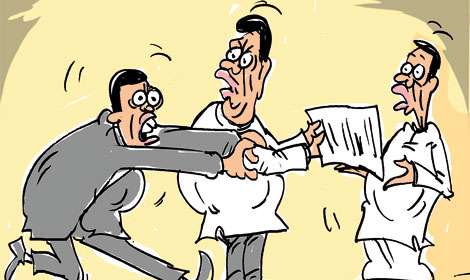18 May 2018 - {{hitsCtrl.values.hits}}
 By Shabiya Ali Ahlam
By Shabiya Ali Ahlam
Sri Lanka’s economic growth will witness a leap in the near future, if efforts are taken to iron out issues and integrate innovation across all levels in three of its key sectors, assured leading global management consulting firm, McKinsey.
According to McKinsey and Company (London) Partner, Ganaka Herath, Sri Lanka’s efforts to focus and eliminate bottlenecks in the agriculture, manufacturing and tourism sectors, will lead to an increase in growth by 3 percent by 2025. “By working on these three sectors alone, a leap can be achieved and having just 3 percent more GDP is something valuable. For this we need an increased focus and it is observed that the government is working on this as well,” said Herath addressing the ‘Future of Business’ forum hosted by the Ceylon Chamber of Commerce, in Colombo, yesterday.
Given the current status of the mentioned sectors, it was opined that there is a need for digital infrastructure recreation for any progress to be witnessed.
While efforts are mandatory in making the changes necessary in the digital space of these industries, Herath highlighted there is a “distinct lack” of talent across levels and it’s imperative to address the same.
“A lot of people know how to use technology but it is not enough. More work is required and an increased awareness on how such digital transformation can help uplift these sectors,” he added.
It was stressed that in the fast-evolving operative environment, the need of the hour is a new viewpoint, speed and the right talent.
While local industries typically compete globally with a similar line of products and services they offer to the international platform, it was pointed out that competition must be looked at differently and we must have a 360 degree view of the competition.
Furthermore, the longer the time spent on planning, the greater the loss, said Herath, since in the current environment it is easy to become irrelevant within a short period.
“We are in a world where we need to do things fast and for that you need to think of increasing speed. You need to do away with the six or nine-month planning cycles,” he stressed.
Finally he stressed the need to have a workforce that is capable of handling digital transformation as “everything to do with digital is to do about the people that run it,” professed Herath.
Although policy makers have acknowledged the need to embrace change for progress, the island nation is still in dire need of new growth drivers.
According to the Ministry of Development Strategies and International Trade Advisor Anushka Wijesinha, the old drivers of growth have run out of steam leading to slow unsophisticated growth, leaving the country increasingly vulnerable to external shocks.
He noted that the next growth spurt has to come from innovation, which needs to be entrenched in the development efforts of at least the key industries.
18 Nov 2024 3 hours ago
18 Nov 2024 4 hours ago
18 Nov 2024 4 hours ago
18 Nov 2024 4 hours ago
18 Nov 2024 4 hours ago